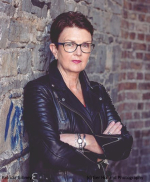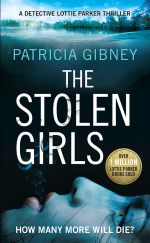Author R&R with Patricia Gibney
 After Irish native Patricia Gibney's husband died in 2009, she turned to art and writing, self-publishing a children's book entitled Spring Sprong Sally. Gibney then started writing crime fiction and created her first novel in that genre, 2017's The Missing Ones, which eventually led to further novels, an agent, and book contracts with Bookouture (now part of Hachette).
After Irish native Patricia Gibney's husband died in 2009, she turned to art and writing, self-publishing a children's book entitled Spring Sprong Sally. Gibney then started writing crime fiction and created her first novel in that genre, 2017's The Missing Ones, which eventually led to further novels, an agent, and book contracts with Bookouture (now part of Hachette).
The second of those crime novels, The Stolen Girls features Gibney's series protagonist, Detective Lottie Parker, who begins to believe she's after a serial killer as girl after girl goes missing just to turn up dead. Can Parker and her team find the latest victims before it's too late?
Gibney stops by In Reference to Murder to talk about researching and writing The Stolen Girls:
 When I started writing The Stolen Girls, I knew I wanted to include something in relation to the Kosovo war. My late husband Aidan was a sergeant in the Irish Defence Forces and had served two six-month tours of duty in Kosovo under the NATO flag. He was stationed there straight after the conflict ended. His first time was in 1999-2000 and his second time was in 2001. He died in 2009 after a short illness, aged 49 years. His death plunged me into the darkest period of my life and I only escaped the darkness through writing very dark themed stories.
When I started writing The Stolen Girls, I knew I wanted to include something in relation to the Kosovo war. My late husband Aidan was a sergeant in the Irish Defence Forces and had served two six-month tours of duty in Kosovo under the NATO flag. He was stationed there straight after the conflict ended. His first time was in 1999-2000 and his second time was in 2001. He died in 2009 after a short illness, aged 49 years. His death plunged me into the darkest period of my life and I only escaped the darkness through writing very dark themed stories.
Aidan returned from Kosovo with stories and photographs of the aftermath of the war. Ordinary families with their homes shelled and bombed. Frightened wide-eyed children. Shoeless and broken. Houses without a roof or a door. I had seen the Balkan war unfold on television and was horrified by the acts of genocide. I read further into the conflict, and because Aidan had served in Kosovo, I wanted to include it in some format in The Stolen Girls.
I always loved history as a subject when I was in school and I am an avid reader, so the first place I go to find my sources for research is my local library. It is a fantastic resource for my community. I borrowed a book called, A Problem from Hell by Samantha Power. The section in the book on Kosovo opened my eyes to even more of the horrors which had occurred during the conflict. I was astounded by the human organ trafficking. I read more about it online and it formed the basis for part of the plot of The Stolen Girls.
Ireland has a Direct Provision Service for asylum seekers. The system has come in for a lot of criticism by human right organisations, branding it inhuman and degrading. There was talk at one time of a Direct Provision Centre being located in my home town. It was to be situated in the Army Barracks that had closed down a number of years previously. However, it did not come to pass, but I used the army barracks as a fictional Direct Provision Centre in The Stolen Girls and this provided me with a link to the Irish Defence Forces time in Kosovo.
I find that researching a subject nowadays can be like falling down the proverbial rabbit hole. You go online to look up one thing, and three hours later you raise your head from the screen following a marathon swim through an ocean-like swathe of information, usually bearing no relation to the subject you started out researching. So it is important to approach research, particularly online research, in an organised and methodical way. Otherwise there is a danger you will have gathered so much new information that you will want to write it all into your novel. Be careful. These are the sections that readers skip. Most readers of crime fiction want to get on with the story, they want it to be pacy and page turning. They want to solve the mystery! So my advice is to be sparing in the amount of historical/research information you include. Use it to advance the plot not to hold it up.
The plight of the young women in The Stolen Girls, is a universal problem. They come to a new country to possibly escape wars or the poverty of their own countries, and because some of them are already vulnerable they become ripe pickings for those who want to take advantage of them. This leads to young men and women, and children, being used and abused, and in turn they become even more vulnerable. They become victims all over again. The research for this part of the story, I found in documentaries on television. Even though they did not deal specifically with asylum seekers and refugees, the programmes I watched provided me with enough information to allow me to get inside the heads of the characters I was creating. For me it is important to feel and see what my characters experience. This can be difficult when I have never been in the situations in which I put my characters. But by reading books and watching documentary programmes, I can achieve a general sense of the hopelessness of the circumstances they find themselves in.
I think location in my crime novels is very important. I created a fictional town of Ragmullin, loosely based on my home town of Mullingar in the Irish midlands. It is a town stoked in history and legend, surrounded by beautiful and mystical lakes. I find walking the shores of the lakes gives me inspiration and allows my brain to breathe. I use the lakes in a lot of my work, both as a meditative tool and as a location device. They are beautiful and wild, surrounded by old houses and castles. The lakes are inspirational and provide me with a myriad of creative ideas. I find that a walk along the lake shore, or along the canal, very soothing but at the same time, it helps in awakening dark and mysterious themes for my books. Therefore you will find the lakes and canal feature in The Stolen Girls.
I am new to writing. I can only tell you what works for me and with regards to research my advice therefore is to research with diligence and write it with restraint. Only use the information you need in order to enhance the story you want to tell.
You can learn about Patricia Gibney and her books via her website and following her on Facebook and Twitter. The Stolen Girls is available via all major online and brick-and-mortar booksellers.






 Related StoriesAuthor R&R with Laura ElliotAuthor R&R with Alan OrloffAuthor R&R with Alex Marwood
Related StoriesAuthor R&R with Laura ElliotAuthor R&R with Alan OrloffAuthor R&R with Alex Marwood



